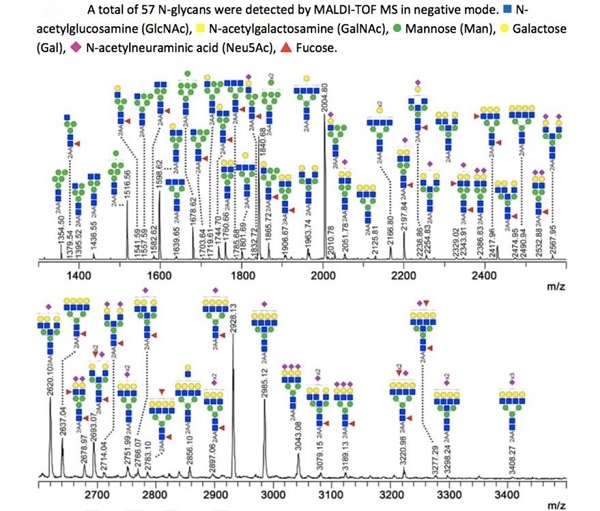Glycan Profile Analysis Service
For the relative quantification of glycan types in glycosylated proteins, MtoZ Biolabs provides glycan type relative quantification services based on MALDI-TOF/LC-MS. Due to the diversity of O-glycosylation modifications and the absence of common enzymes that can cleave all O-glycans, our glycan type analysis currently focuses only on N-glycosylated proteins.
The strategy for glycan type analysis is as follows: all N-glycans in the target protein are digested by PNGase F enzyme, followed by labeling N-glycans with 2-AA, and specifically enriching N-glycans through an SPE column. Depending on the complex glycosylation of the target protein, MALDI-TOF-TOF or LC-MS/MS is used to detect 2-AA-labeled N-glycans, and GlycoWorkbench software (CFG database) is used to identify N-glycans and analyze the relative abundance of glycan types based on the mass spectrometry peak areas of the glycans.

Figure 1. Protein Glycan Profile Analysis
Service Advantages
1. Relatively Short Identification and Analysis Time
2. High Sensitivity and Good Reproducibility
Applications
1. Identification of N-glycan Types in Glycosylated Proteins
2. Analysis of the Relative Abundance of N-glycan Types in Glycosylated Proteins
Sample Submission Requirements

Figure 2. Protein Glycan Type Analysis Sample Requirements
1. If you provide tissue samples, please transport them on dry ice.
2. If you provide protein samples, please transport protein extracted from ordinary tissue and cell lysis buffers.
3. Sample Transport: Please use an ample amount of dry ice and opt for the fastest possible mailing method to minimize sample degradation during transportation.
Deliverables
1. Experimental Procedures
2. Mass Spectrometric Parameters
3. Protein N-glycan Types and Relative Abundance
4. Mass Spectrometric Images
5. Raw Data
Services at MtoZ Biolabs
1. N-glycan Analysis Service
2. O-glycan Analysis Service
MtoZ Biolabs, an integrated chromatography and mass spectrometry (MS) services provider.
Related Services
How to order?







